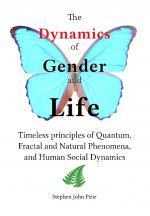To believe in perfection requires a disconnect between our present reality and potentials with some other "up there" state which is separated from "here" and "now."
Key Principle of Life, for Life No. 1 (The Community-As or God-as Principle) affirms that our lives unfold from a vast, invisible web-work of connections, potentials and influences, and that we are never entirely disconnected or separate from All (including God). We are God-as-us, and any abilities ascribed to God are necessarily available to each of us (for as we ... "seek, ye shall find"). More importantly, and of more relevance to most, is that whatever faults we have, or whatever faults and evils we observe in ourselves or others, is necessarily also within God – as within the part, so within the whole.
A belief in a separate distant state of perfection is therefore driven by the fear or inexperience of looking within ourselves to find our own readily-available unbounded potentials.
In historical terms, the collective human psyche can be judged to be in late adolescence, or early adulthood1.
A normal child will see its parent as being superior, strong and all-knowing. Yet the child is confident that it can develop into that adult with attendant strengths and abilities - hence the typical exuberance and playfulness of children. They relish in the magic and mystery of life. They love and live with a natural expectation and anticipation of growing, learning and becoming a grown-up with all those superior, powerful, confident abilities.
This playful expectedness is generally not reflected in those who steadfastly believe in the perfection of God. They do not have faith that they will become as their Father. (As is emphasised in the Bible, when we (as a race) let go instinct and took on free-will, "the LORD God said, Behold, the man is become as one of us, to know good and evil").3
Instead of becoming as their Father, they resign themselves to remaining God’s children, needing to be saved by Him. Hence the frequent use of such phrases as "Jesus saves." Why should a confident, spiritually mature soul need saving ... from themselves? Why would anyone need saving from infinite, loving potential?
Since we are God-as-us, it follows that if we are to be saved it is through knowing ourselves and learning to tap our potentials to create a loving, meaningful life. When we desire to be saved it is because we feel powerless in the face of tradition, dogmas, religious shame, superstition, guilt and social disapproval. We feel trapped and unable to work our way free of the bounds that we have adopted.
Strict rules and behaviours are not natural to life. We like playing, creating and discovering new things ... that is, in part, why entertainment is so popular. The future is filled with fluid possibility and is best engaged by being fluid, open and spontaneous. The idea of some after-death state in which we get to live in ease and peace gains power precisely when we do not have such ease and peace in our normal daily lives.
People who engage their abilities and potential to experience a rich, dynamic, loving and fulfilling life don’t generally spend their hours thinking of some nursing home in the sky where all their wishes are attended to.
It is in the process of realising our dreams that we feel alive. It is in asserting, defining and refining our energy and potentials to achieve meaningful results that we experience the essence of why we are here: to grow and learn how to handle energy, or as some might prefer, how to engage the love of God.
See also
- Is there a spiritual higher-power guiding me?
- The Evolution of the Human Psyche
- Making God small. Not good.
- 1. "The Bible is a profoundly human, deeply flawed, tribal history that has created as much pain as blessing in our world." John Shelby Spong, “The Word of God”, online article from John Shelby Spong website.
- 2. John Shelby Spong, "Eternal Life: A New Vision; Beyond Religion, Beyond Theism, Beyond Heaven and Hell", HarperCollinsPublishers, Sydney, 2009, p. 168.
- 3. The First Book of Moses: Called Genesis, 3:22. Bible, King James Version
 "The Dynamics of Gender and Life" ebook is now available at
"The Dynamics of Gender and Life" ebook is now available at